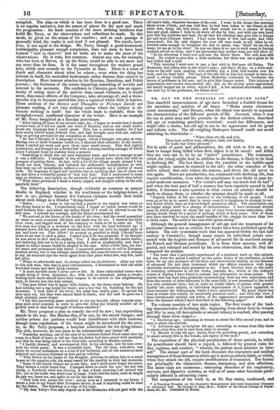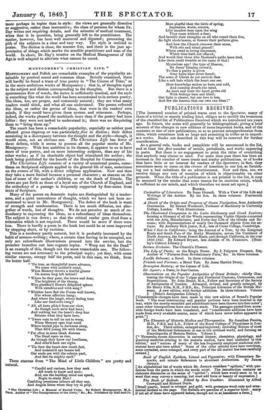DR. DAY ON THE DISEASES OF ADYA.NCED LIFE.*
Tan manifold inconveniences of age have furnished a fruitful theme for the moralists and satirists of all times. " Multa senem circumve- niunt incommode," said Horace, when his object was merely to expound the characteristics of the different periods of life. Juvenal, when it was his cue to paint man and his pursuits in the darkest colours, described old age as something peculiarly wretched : youth has differences, and might offer a choice, but old age is one in its appearance and its great and infinite evils. The all-weighing Shakgpere himself could not avoid admitting its drawbacks—
"When thou art old, and rich, Thou bast neither heat, affection, limb, nor beauty, To make thy riches pleasant."
Yet in spite of poets and philosophers, the old wish to live on, or at least to escape being killed when their object is to be cured : and killed they are very apt to be by an "active" practitioner. The treatment, which the young might bear in addition to the disease, is likely to be fatal in declining life. The lost blood, that the youthful or the middle-aged might replace, cannot be restored in the old ; the other remedies of the active school, that only reduce the mature, pull down the old never to rise again. There are peculiarities, too, connected with declining life, that require consideration, even when the practitioner is not likely to pass be- yond moderate measures. "For virtue's self may too much zeal be had"; and when the best part of half a century has been regularly passed in bad habits, it becomes a nice question to what extent an attempt should be made to change them, or whether the attempt should be made at all. "Regular habits of life are essential to the wellbeing of old people. I will even go so far as to assert, that in many cases it is dangerous to attempt to cor- rect habits which have an acknowledged pernicious effect. The constitution can no longer adapt itself to a change of circumstances. I have witnessed several cases in which persons at about the age of sixty have become teetotalers, after having drunk freely for a period of perhaps thirty or forty years. Few of those men have survived to enjoy the moral benefits of the change for more than two or three years. The same is the case with opium-eating."
Although the general management of old age and the treatment of its particular diseases are so critical, few books have been published upon the subject. The only systematic work that has appeared within the last half century is Canstatt's ; though many essays on individual points con- nected with the hygiene and diseases of advanced life lie scattered among the French and German periodicals. It is from these sources, well di- gested, and enlarged and tested by his own observation, that Dr. Day has composed his treatise. "The want that I personally experienced of a standard work on this subject, led me, from the period I entered on the active duties of my profession' to note down for my own guidance all the facts and observations bearing on the diseases of advanced life and their treatment which my official connexion with large charitable institutions daily presented to me. I have likewise been in the habit of recording references to all the works, journals, &c., which in the ordinary course of reading I have found to contain any information on these points. The matter that has been thus gradually accumulating from my own experience, and from the records of other labourers in the same field, is now presented to the world ma very condensed form; but, in order to enable others to pursue with greater facility the same subject, or individual departments of it, I have appended to these remarks the bibliography which I have constructed. My great object has been to render this volume an essentially practical work ; and with this view, I have intentionally omitted any notice of the appearances presented after death from the diseases which I have described in the following pages."
The volume consists of two main topics. The first treats of the lead- ing characteristics of declining life; beginning from about forty in women and fifty in men, till decrepitude or second infancy is reached, after passing through these three stages-
" 1. Declining age ; extending in women to about the fifty-second year, and in men to about the sixtieth.
"2. Advanced age, or incipient old age; extending in women from fifty-three to about sixty-five, and in men from sixty to seventy. "3. Mature or ripe old age; dating from the preceding period, and extending to about seventy-five in the female, and eighty in the male.'
The exposition of the physical peculiarities of these periods, to which the practitioner should have a regard, is followed by general rules for diet, regimen, and conduct, "wherein the patient must minister to him.. self." The second part of the book discusses the characters and medical management of those diseases to which age is more peculiarly liable, or which, when they attack the old, require modifications of treatment. The former are principally the climacteric disease, marasmus, and skin affections. The latter class are numerous ; embracing disorders of the respiratory, nervous, and digestive systems, as well as of some other functions parti. cularly affected in advancing years. The composition of the work is, as Dr. Day states, condensed, and
* A Practical Treatise on the Domestic Management and most Important Diseases of Advanced Life. By George G. Day, M.D., Fellow of the Royal College of Myst-. dans, ece. &c. Published by Boone. more perhaps in topics than in style: the views are generally directive or suggestive, rather than instructive; the class of persons for whom Dr. Day writes not requiring details, and the minuthe of medical treatment, when that is in question, being generally left to the practitioner. The matter, however, has been well mastered and digested ; presenting the pith of the subjects in a clear and easy way. The style is entitled to praise. The diction is close, the manner free, and there is the just ap- preciation of things which marks the sensible practitioner and man of the world. In short, Dr. Day's treatise on the Medical Management of Old Age is well adapted to alleviate what cannot be cured.































 Previous page
Previous page